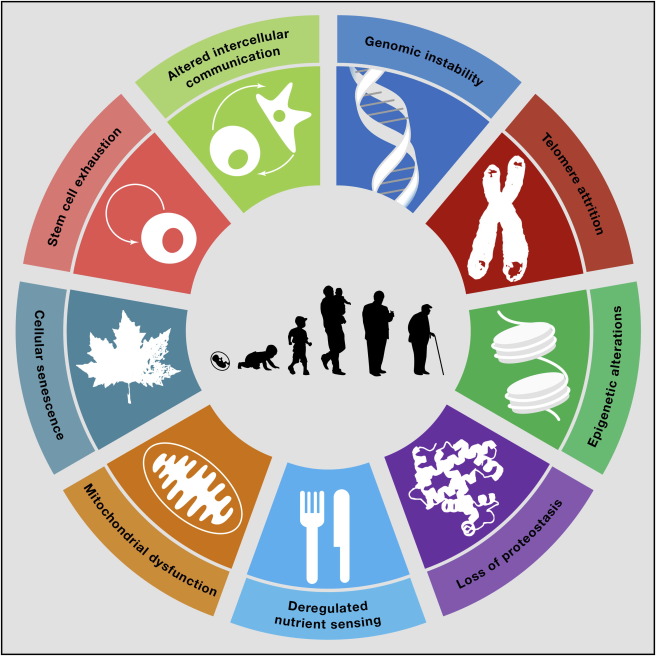Anti-aging research is on a roll
It's been a GREAT month for longevity research so far.
(I *still* feel a little weird calling these studies "anti-aging" or even "longevity" studies because the two words just scream pseudoscience. In a way though it really shows you how fast the field's been progressing for the past bit. It's pretty fantastic that rejuvenation is no longer a fringe science. So...no snake oil here, these studies are legit.)
Perhaps by this point the headline "old mice made young again" doesn't even catch your attention anymore. There's certainly been a LOT of studies in this domain for the past few years, but the reason is that aging is multifaceted, in that many biological processes can drive the aging process (see graph below). Because of this, there are also many potential points of intervention to slow or even reverse aging symptoms, and scientists have been making progress on all fronts.
The hallmarks of aging. DOI: http://dx.doi.org/10.1016/j.cell.2013.05.039
I've blabbered quite a bit about young blood's powerful, multi-organ rejuvenation powers. Also quite famous (and rather controversial) is resveratrol found in red wines, which debatably protects telomeres from shortening with age. For those not in the know, everytime your cell divides, the molecular machinery behind DNA replication eats away a bit at the telomeres that act like caps at the end of DNA strands. Because telomeres protect the integrity of DNA, scientists believe that their shortening with age eventually damages the cell and, in turn, causes aging at the tissue and organism level.
So how can we protect our DNA? A few weeks ago, Harvard anti-aging megastar David Sinclair published a study showing that supplementing a chemical called NMN reserved signs of DNA damage in the liver of aged mice. The molecule was previously found to protect aging muscle tissue as well. When ingested, NMN turns into NAD (some of you may be nodding now), a superstar molecule that our bodies produce naturally.
NAD does many, many things through its interaction with its diverse protein partners. It helps our cell's powerhouse, the mitochondria, communicate with the nucleus--cell's control center where DNA is stored. This new study shows that NAD also protects DNA integrity, by stimulating the activity of an important DNA repair workhorse protein called PARP1. The evidence for NAD supplementation is starting to build up in mice, and Sinclair even founded a company to further study (and commercialize) NAD-related molecules. So far there hasn't been many studies looking at supplementation in humans, so the jury's still out there whether or not NAD supplementation works in humans. Some even go so-far as to call the whole thing a fad.
But NAD is sort of old news. What *really* caught my attention was a brilliant study that figured out a way to spring clean an old mouse's aged cells, which I covered in more detail here at Singularity Hub.
The TL;DR is this. When our cells get old they have three main fates: suicide, turn cancerous, or go into a state called senescence, where they stop dividing and generally seem to be benign.
As it turns out, senescent cells are actually pretty harmful to the tissues around them. They regularly spit out a toxic chemical soup called SASP, which some researchers believe can cause the body to age. A previous study published late last year showed that if senescent cells are automatically killed off via genetic engineering in mice, the mice get healthier in old age and live 20% longer. Great proof-of-concept, but not plausible in humans.
What this new study did is that they developed an injectable drug that tells senescent cells to kill themselves, while sparing healthy cells. They found that the reason why senescent cells don't commit suicide is because they have a protein that locks up p53, a death protein, preventing its action like a pair of handcuffs. The drug elbows between the protein and p53, freeing the death protein to perform its job--voila, the senescent cell dies.
Because young, healthy cells don't have that protein, they're protected from the drug's effects.
Aged mice that received the drug had healthier kidney function, fur coats and generally were more active than those that got only controls. The team is still trying to figure out whether the drug extends lifespan, rather than just making an aged animal healthier. Since the drug is injectable and is modeled after drugs already proven to be safe for stroke patients, it's a great candidate to try out on humans.
If that sparked your interest, get the details here. I'm *really* excited to keep watching the rejuvenation field and pushing forward my own work in reversing brain aging. Science is seriously freaking awesome!













